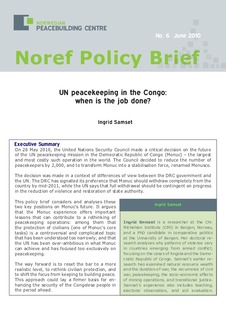UN peacekeeping in the Congo: When is the job done?
Research report

Permanent lenke
http://hdl.handle.net/11250/2474630Utgivelsesdato
2010-06-01Metadata
Vis full innførselSamlinger
- Publications [1488]
Originalversjon
Oslo: Norwegian Peacebuilding Centre (Noref Policy Brief no. 6, June) 7 p.Sammendrag
On 28 May 2010, the United Nations Security Council made a critical decision on the future of the UN peacekeeping mission in the Democratic Republic of Congo (Monuc) – the largest and most costly such operation in the world. The Council decided to reduce the number of peacekeepers by 2,000, and to transform Monuc into a stabilisation force, renamed Monusco. The decision was made in a context of differences of view between the DRC government and the UN. The DRC has signalled its preference that Monuc should withdraw completely from the country by mid-2011, while the UN says that full withdrawal should be contingent on progress in the reduction of violence and restoration of state authority. This policy brief considers and analyses these two key positions on Monuc's future. It argues that the Monuc experience offers important lessons that can contribute to a rethinking of peacekeeping operations: among them that the protection of civilians (one of Monuc’s core tasks) is a controversial and complicated topic that has been understood too narrowly; and that the UN has been over-ambitious in what Monuc can achieve and has focused too exclusively on peacekeeping. The way forward is to reset the bar to a more realistic level, to rethink civilian protection, and to shift the focus from keeping to building peace. This approach could lay a firmer basis for enhancing the security of the Congolese people in the period ahead.
Utgiver
NorefSerie
Noref Policy Brief 6, JuneNoref Policy Brief 6, June